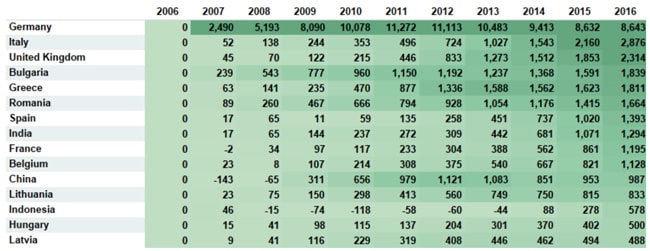Foreign enrolment in the Netherlands reaches a record high in 2016/17
Higher education institutions in the Netherlands received a record number of international students this year: over 112,000 international students were enrolled for the 2016/17 academic year according to new Nuffic statistics. This included 81,392 degree students – the highest ever number of foreign students pursuing degrees in the Netherlands and the country’s best recorded annual growth (6,163 over 2015/16). More than one in ten (11.4%) of all students in Dutch higher education institutions are now international degree students, with this proportion rising to 18% at research universities and to 22% in master’s programmes. Non-degree students contributing to the overall figure of more than 112,000 international students include:
- At least 11,500 credit-mobile EU/EEA students participating in the Erasmus+ programme on exchange or work placements as well as some EU/EEA students not in Erasmus+;
- Over 19,360 credit-mobile students from outside the EU/EEA.
Increasingly multinational campuses
The sheer numbers and growth of international students now studying in degree programmes in the Netherlands tell an impressive story, but there’s more: foreign degree students represented 164 different nationalities in 2016/17, marking five straight years of a trend toward greater diversity. South and Eastern European countries, the United Kingdom, Indonesia, India, and the United States represent noteworthy contributors to this greater variety in the student mix.
Germany remains the most important sending market for the Netherlands, followed by China. In third place now is Italy, whose strong growth displaced Belgium from this spot (Belgium is now the fourth most important sending market, and the UK is fifth). In one notable development for this year, Nuffic reports that Eastern and Southern European are becoming more important in terms of sending markets within the EU/EEA.

Popular programmes
Dutch master’s programmes and research universities are experiencing particularly impressive increases in international enrolments. Nuffic reports that “over one in four of all new master enrolments in 2016/17 was an international student.” This increases to one in three in engineering, economics, and business, and almost half of new enrolments in agriculture are international students. Nuffic reports that non-EU/EEA students are “strongly over-represented in MSc. programmes in engineering, science, and agriculture.” Relatively speaking, Dutch universities of applied science are experiencing less overall growth in international enrolments than are research universities. At research universities, the field of engineering is very popular among new international students, with enrolments growing by 18.6% in 2016/17 over the previous academic year to a total of more than 7,300 international students.
Master’s programmes especially popular
When it comes to bachelor’s versus master’s degrees, non-EU students are “twice as likely as students from other EEA countries to enroll in master’s programmes at [research universities].” Nuffic notes also that students from outside the EU tend to be older and have more work experience than those from within the EU.
Post-graduate students working
Increasing “stay rates” of international students – that is, the proportion of those students who choose to immigrate to the new country for a longer term, or even permanently, to live and work – is often a key goal for major knowledge economies. Among other benefits, healthy stay rates help to offset the effects of low birth rates and ageing populations, both of which are common in many developed countries. On this measure, the Netherlands is doing very well: nearly half (four in nine) PhD students working in the Netherlands now have a nationality other than Dutch, and PhD students have longer stay rates than those with less advanced qualifications. Nuffic elaborates:
“Both international degree students and international PhD students are estimated to have so called stay rates of ca. 38% at five years and 30% at ten years after graduation. With a lifelong stay rate of 25%...international degree students contribute at least €1.57 billion extra to the Dutch treasury on a yearly basis. A smaller but similar effect is expected from international PhD graduates. Also, international students in general contribute to the Netherlands knowledge economy through research, innovation, and easier transnational cooperation.”
The stay rates among non-EU/EEA students are longer than among students within the region, likely indicating a mindset oriented toward immigration as well as study among non-EU/EEA students.
An effective marketing strategy
Another interesting element of the Nuffic report concerns the contribution of “NESO” countries to international student enrolments. “NESO” stands for the “Netherland Education Support Offices” located in 11 non-EU/EEA countries. These offices are tasked with “the positioning and branding of Dutch higher education in non-EEA countries with expanding demographics, economics, and higher education systems.” The Netherlands has NESO offices in the following 11 markets: China, Indonesia, India, Russia, Turkey, South Korea, Vietnam, Mexico, Brazil, China, and South Africa. NESO countries have been responsible for the greatest increase in international degree students of all sending countries (+150%, compared to +110% from non-EU/EEA countries without NESO offices and +105% from EU/EEA countries). Among NESO countries, Indonesia is responsible for the most growth in 2016/17, with the result that Indonesia is now poised to overtake India as a major sending market to the Netherlands. For additional background, please see:













